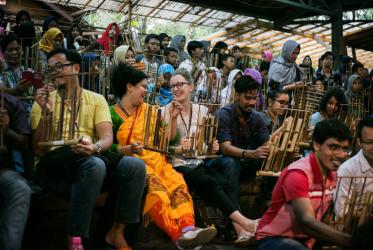Displaying 141 - 160 of 233
31 May 2018
Missional formation plenary encourages discipleship
12 March 2018
Youth in Asia can now apply for WCC inter-religious training
15 February 2018
Bossey commended by University of Geneva
02 February 2018
Bossey’s ministry continues, now inviting applications for 2018-19
09 November 2017
Re-engineering life forms: Church forum raises concerns
09 November 2017
Responsible agriculture investments theme of WCC session
16 October 2017
Forum strengthens ecumenical commitment to diakonia
12 October 2017
WCC commission reflects on challenges of ecumenical formation
10 October 2017
Seminar explores how populist rhetoric leads to racism
07 September 2017
GEM School: integrating theology and economics
05 September 2017















